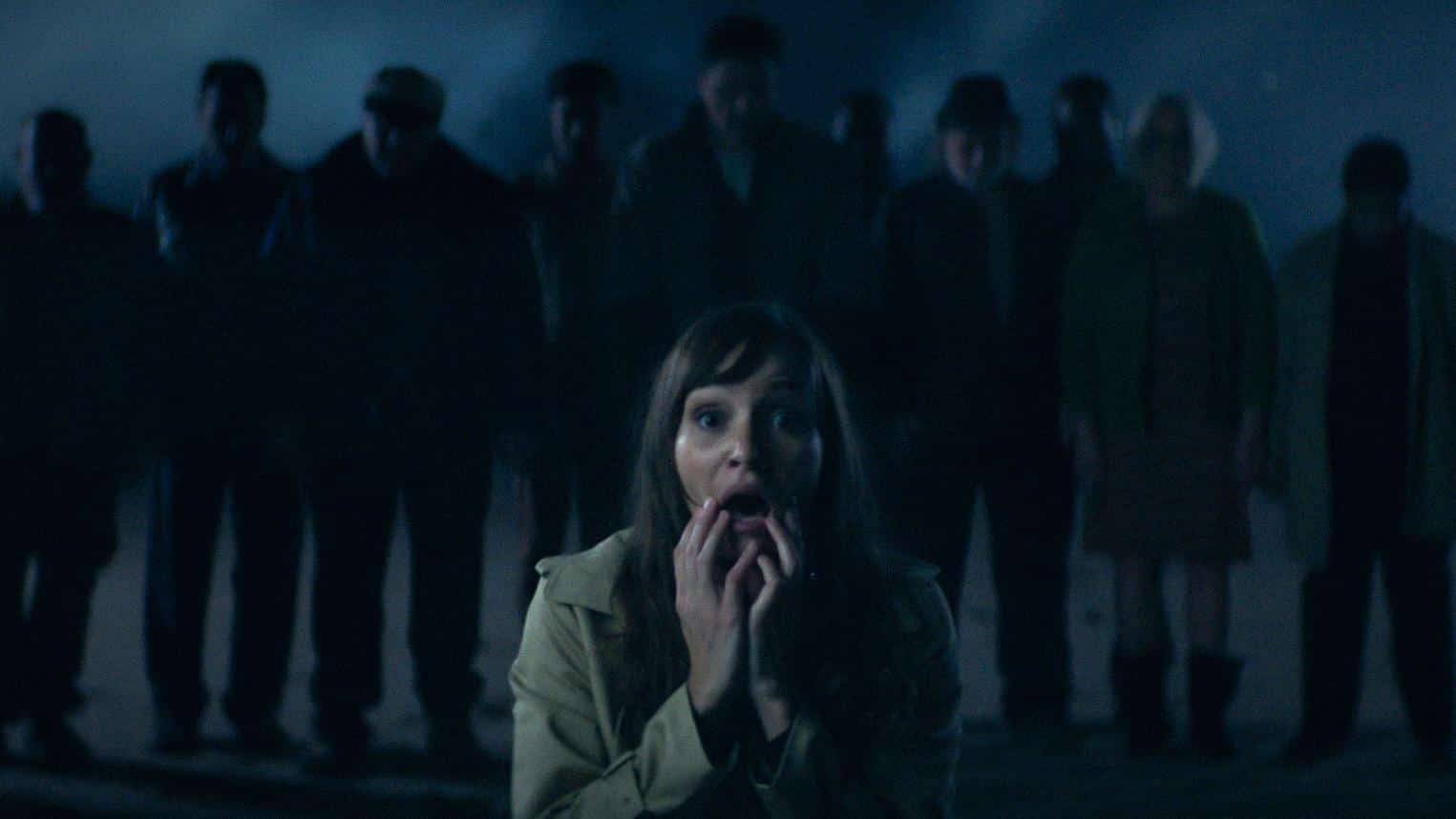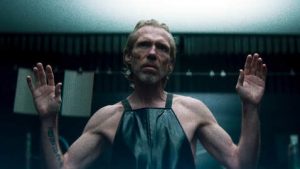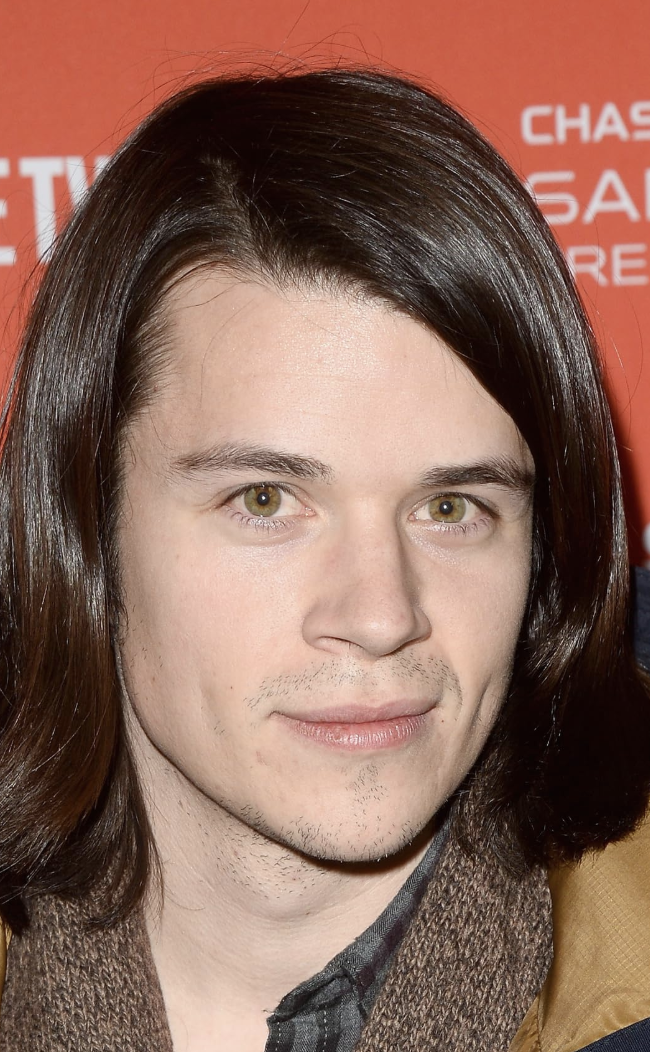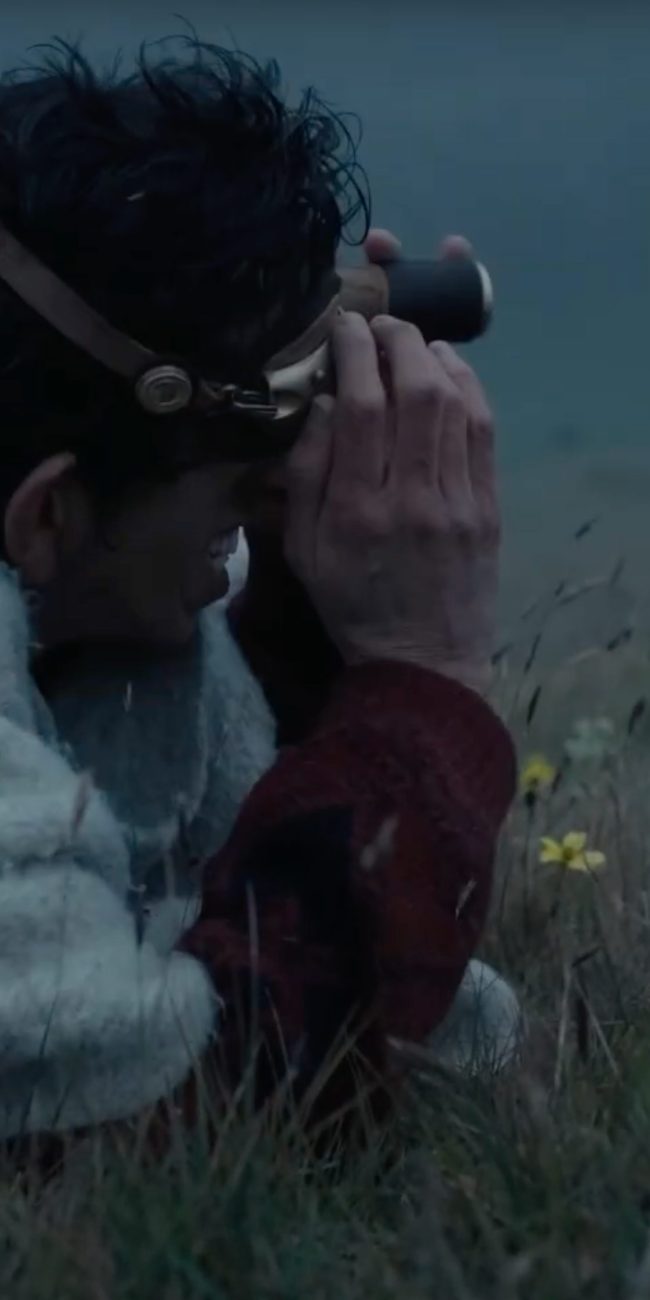A Conversation with Mickey Keating (OFFSEASON)

Mickey Keating is one of the most prolific director’s working in genre films today. I’ve been covering him for years going back to a little film called Pod which terrifies me to this day because I still don’t know what was in that basement. So whenever Mickey’s got a new film playing at a fest that I’m covering I know that I’m inevitably going to end up writing about it because it’s really fun to see a filmmaker grow and, particularly with Mickey, he just wears his current inspirations so strongly on his sleeve that it is so fun to talk about his films with him.
At SXSW this experience couldn’t have been more illuminating because I managed to see his newest thriller Offseason right before Kier-La Janisse’s exhaustive documentary Woodlands Dark and Days Bewitched. I immediately went back and watched Keating’s film with an eye towards everything I had just witnessed in the scholarly overview of folk horror. So when I got to talk to Mickey I basically just fed him my outline that I had completed of Janisse’s film and asked him to respond to it.
Woodlands Dark And Days Bewitched points to landscape as the site of terror. We see this again and again in offseason, from the Cemetery to the palm trail to the beach. Often, there is an emphasis on nature reclaiming our modern world. This is perfectly showcased in the ruins of the Cemetery which feel like they are being overrun by the foliage. The supernatural is often just on the edge of town or just off the coast.
Hammer to Nail: Clearly we have a bit of the Cthulhu mythos arising here, with the ancient text and the phrase he’s awake. And the monster that arrives from the sea.
Mickey Keating: Obviously, I love beach side and seaside horror. I think that going back to Lovecraft, and that idea is something that just naturally feels right. Because I grew up in Florida, there are all these bridges that pretty much you’re at the mercy of them if you’re in a car, and so to create that visual sense of isolation, of being locked out somewhere, I thought there’s nothing more perfect to do.
HtN: Isolation is a big part of folk horror and the idea that isolation breeds sickness. We’re here in the spectre of a colony that is failed, a small town hiding a terrible secret. We have dialogue like “there’s something wrong with this place” and even “a long time ago the early settlers couldn’t survive the storms.”
MK: For this movie, I really, really wanted to just throw the audience into the uncanniness. The greatest way to make someone feel like an outsider…Because this is a very relevant theme, I feel like, in our day and age, feeling like an outsider in a place that typically in theory you belong. We’re all Americans, right? This shouldn’t feel like a whole other country when I’m going to just a different state.
HtN: Right. This town essentially is closed to the rest of the world, for the season. The outsider (played by Jocelin Donahue) has come to town, and the outsider finds herself trapped. Obviously we see the bridge going up, but we also see the car blocked in by the palms.
MK: That effort of ominous nature, of just throwing the audiences, is what I wanted to capture, and so we really, to convey that it’s the idea of being stared at, of people just watching you or even just going about your day and noticing that there’s someone in your peripheral vision who’s just looking at you like the people in the woods, just the sense of unease of everyone treating these characters like they’re not locals. They don’t belong here. They’re trespassers in a place where in theory it’s whole livelihood depends on outsiders.
HtN: In folk horror there is often this middle class fear of the poor or the degenerate countryfolk, which I think we’re seeing her come into this town with. This is a place her mother told her not to visit. Even if they’re not that bad, but as an outsider, you look at them and they’re like, “Okay, there’s something wrong with these people.” And I’m especially thinking about in the bar scene when they show up and no one will talk to them. Who are these people? I mean, everybody keeps saying, “There’s something wrong with this place.”
MK: I think it’s so funny because when we made the movie, especially, and still now, the general idea of the country just feeling so divided, it was an effort to not be like, “All right. We’re going full Deliverance, country bumpkins, that kind of thing.” The world’s in a different place than when Deliverance was in a lot of ways. So what I really wanted to be able to do is the people that belong, they are all the descendants of that initial pact who have learned to navigate and operate in the world as it progresses now. But there’s still something about them that’s still the same old people from that pact.
HtN: Right, and that’s another thing. The threat comes from the past, but it’s a past that you’re not necessarily nostalgic about. It’s a problematic past.

Filmmaker Mickey Keating
MK: I wanted to stray a little further away from “Oh, small town bad,” and more towards this idea of, “No, this town wants people to come.” They want people there sometimes, and then the rest of the time, then they can shed their skin, as it were, and reveal themselves for what they are. But they are as dependent on the rest of the country and tourism as anybody else. The hillbillies in Deliverance, they don’t want anyone there, and they hate modern progression. But this movie, there is that weird symbiotic relationship in a sense, because this is a tourist town.
HtN: There’s a little bit of utopianism with the toll bridge operator. He’s like, “Oh, I’m not allowed in there yet. It’s heaven.”
MK: Yeah. Yeah. And some person’s idea of heaven is another person’s idea of complete hell, and showing that two sides of the coin is…Then that’s what I said to Richard Brake, I said to him, “I don’t see you as a villain.” I see him as a very tragic person who wants to be part of this, in your mind, this idyllic sense of heaven. You’re doing everything that you can just being a complete lackey for these people in the hopes. It’s like a dog jumping up trying to get a bite of the food on the table. That’s what you are. It’s very tragic. You’re not evil. I suppose the offer of eternal life in a sense can be thrilling to people. It’s like, “Oh, I get to live forever, and all I have to do is suck up to the sea god out in the ocean for a little while? Why not? I’ll take it.” Some people would take that deal, I feel like.
HtN: Like they tell her “Ain’t nothing wrong with these people, they’re just cursed is all, the whole damn island is cursed.” Her mom says “don’t take me back there” – again, it’s that feeling of the island living in the past. And when Marie gets there it’s like walking into another decade. Which of course is also something that’s a big part of the settings for folk horror, an ambivalence about progress. The friction between the present and the past, “What is wrong with these people?” she says almost right away when she gets there.
MK: Well, it definitely is the effort to create almost this weird idea of fading Americana, I suppose, where it’s the idea of like, “Oh, the American spirit going down and mining a place for resources that might not be very convenient,” or alternatively now in more modern times where it’s like, “Disney world is so huge. Let’s make our own tourist trap.” That kind of idea of faded Americana was the jumping off point.
HtN: I love it. Yeah. So when you were talking about the tourist trap, I’m thinking about that scene where she comes back to the town and she’s by herself. She’s wandering through the museum that’s closed and the flower shop, and to me it’s like the carcasses of modern society just left behind.
MK: 100%. Yeah, totally. And it’s very uncanny. Inherently, it’s these places that should be teeming with life that are just absent of any soul, which I think is very scary.
HtN: There is a sound that’s playing through that whole thing. I mean, there’s a lot of sounds, which I love. I love the sound design, but I feel like I’m hearing over and over again somebody saying in the museum, “And for the future, who knows?” Am I hearing that right?
MK: Yeah. That’s right. That was one of those things when I wrote the script, because I’m sure at some point everyone goes through some tacky museum that has some weird narrator explaining everything through the crappy intercoms, and so like that’s the effort that if she’s walking through this timeline backwards. So that was supposed to be the optimistic, Disney, “See you soon. Who knows what the future will bring?” But she keeps going deeper and deeper into this nightmare. Yeah, that was just a weird little cheesy Florida museum aspect that I wanted to throw in.
HtN: Is she going deeper into the past as she goes through the music?
MK: Yeah. Yeah, exactly.
HtN: I love that. So to kind of dive into the uncanny a little bit, you’ve definitely gone full on Eldridge with the thing out in the sea. I enjoyed being able to pause it and see exactly what I was looking at because you give us maybe like 15 tenths of a second total on the screen of what it is, which I love. I love the design, but it lurks in the back through the whole film. They talk about it being a man. A man came out of the sea, but when it arrives, it was not a man at all.
MK: Yeah.
HtN: How did Lovecraft influence this film other than the obvious tentacles and water creatures?

Richard Brake in OFFSEASON
MK: Yeah. Well, you know what so funny, it’s that I knew that no matter what, you put the subject matter into play, there’s no escaping Lovecraft. I think that the Shadow Over Innsmouth, especially that feeling, again, going to a place where there’s just something off about everybody and there’s just this blooming kind of cloud of dread is definitely something you can’t escape it. I would be forced to be like, “Oh, well, you know, I don’t even like Lovecraft,” because he’s inspired literally every horror filmmaker to an extent. So it was the effort to really build something where it led going back to this idea of folklore and even biblical references. A literal angel is some horrific monstrosity as it’s described in the Bible. When you see it, it’s described as an angel, and so that’s what I wanted to do with the man from the sea. Clearly, there is nothing human about this thing, but as the lore keeps growing, it’s easier to use those real simple references for people who might not understand, like a child’s story time book or something.
HtN: Totally. Another big part of folk horror, which obviously is a big part of this, is that pagan ritual of a town that has a secret and somebody’s coming in from the outside. They all know the deal, and she doesn’t know the deal. Tell me a little bit about what’s below the surface, because I love that line when he says, “You’ve been on it this whole time. It’s below you.”
MK: Yeah. Yeah. Yeah. It definitely below the surface, I think it was the effort…I know this sounds like a cop out, but I definitely wanted the audience to…Their interpretation of that is as interesting to me as my intention. I definitely just wanted to tell at a base level a story of a group of people who are theoretically were desperate and maybe felt isolated or helpless and sold their soul for this optimism that ended up screwing them completely and screwing them for generations. That effort to tell this story where it’s like, “Oh, my family did something really bad, and somehow that mark still carries with me to my kids and this sense of shame.”
HtN: Well then there’s that thing about the group coming together to make a sacrifice, and usually it’s a sacrifice from the outside. Offseason is sort of in-between because the sacrificing is from the outside, but she’s connected to the inside. It’s a combination of the Wicker Man and The Lottery. They’re like, “Oh, we’ve got this girl, and she’s going to be the perfect opportunity to sacrifice.”
MK: Yeah. Also, in some degree too, it’s like, “Well, look, this is what happens, and if you piss us off, it’s going to happen to you.” You’re part of this secret ring of people that you can’t escape. So this is your slap on the wrist, and you’re going to see what happens because this is what your mom did. That really is frightening to me, being part of a club that you don’t even know that you’re part of until it’s too late.
HtN: I was just thinking, not only is it below the surface, like you said, it’s literally below them, in the land. What does Miss Emily say? “Take a look down, darling you’ve been standing on him since you got here.”
MK: It’s very, very, very literal.
HtN: Yeah. Okay. Last question. Let’s talk a little bit about her fiancé or husband. Is it her husband? [played by Joe Swanberg]
MK: We played it more as they are on again, off again, boyfriend/ girlfriend kind of.
HtN: Okay. Because he bails on her several times during the movie, sometimes intentionally, but most of the times just…so tell me how you wanted that to operate in the film because it’s very much set up as “We’re going to go through this together,” and it seems like he’s basically never there when she needs him which is…
MK: Yeah, true.
HtN: It’s sort of the anti- of female empowerment. It’s like, “Look, you need somebody. You need help,” but not in a misogynist way. It’s just like, “Oh, well this sucks.” A lot of these folk horror films just pick on the women in it. They have to be the sacrifice, and she can’t escape. The one guy who was supposed to be there to help her, he just bails on her.
MK:Yeah. Yeah. He crumbles instantly, because I love the idea that they want to get out, but they crash the car. Then he’s taken first. He’s not supposed to be there at the beginning and they make that pretty clear. I hate when romance is really shoehorned into especially urgent stories. I thought it was very thrilling this idea of two people who really haven’t spoken to one another. The dynamic that we built up between Joe [Swanberg] and Jocelin [Donahue] was that they might’ve had some sort of relationship, and then her mother got ill. Then she completely disconnected. Then they faded away, hadn’t spoken to one another for a while. Then as she was starting to live her life again, this happened.
So being the daughter of a movie star, she was like, “There’s not very many people I can trust because they might go run and sing to the press or whatever. So I’ll call this guy who maybe he’s…” Joe refers to himself the therapy dog in this movie, even though he’s really terrible at his job. So that idea of these two people who had been in a car for two days, not spoken to one another, he’s being given the least amount of information so that by the time she finally opens up to him, he’s like, “What the fuck are you telling me? Do you realize how absurd that this sounds?” And that’s why I told Jocelin, and I think that she is such a good actor because I was like, “When you tell the story of the man from the sea, it should be embarrassing because this is absurd to you. And you know this is absurd.”
HtN: And his reaction is completely appropriate to the absurdity of it.
MK: So then when he gets into the car crash, in my mind, well, he’s completely useless. He doesn’t help at all. In a way he’s being used as a puppet and standing in her way later in the film. Yeah. In some way I definitely feel like it’s funny that he’s the only one who really gets it in the movie. He really gets a real bad end of the deal.
HtN: That makes me happy. He deserves it. All right. Well thank you so much, Mickey. It’s great to see you again.
MK: Oh, thank you. Yeah, absolutely. I have another movie that we’re in post-production on now, so hopefully we’ll be able to talk again soon.
HtN: Yeah. Absolutely.
– Bears Rebecca Fonté (@BearsFonte)











